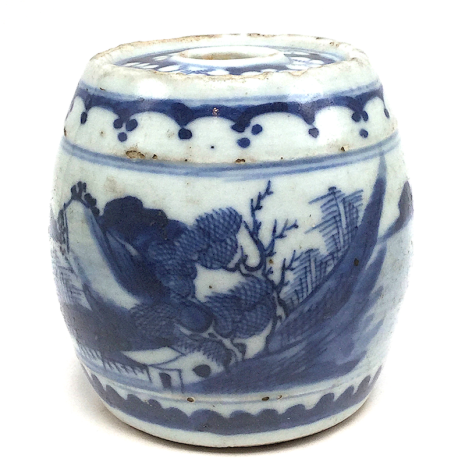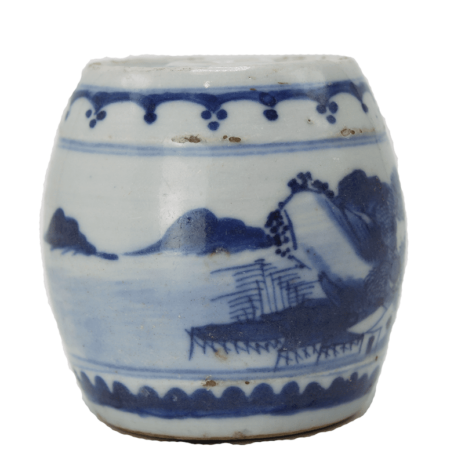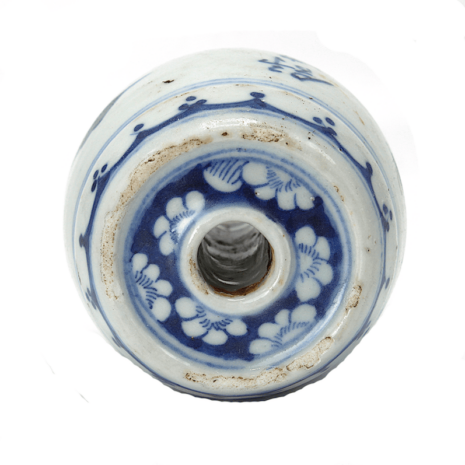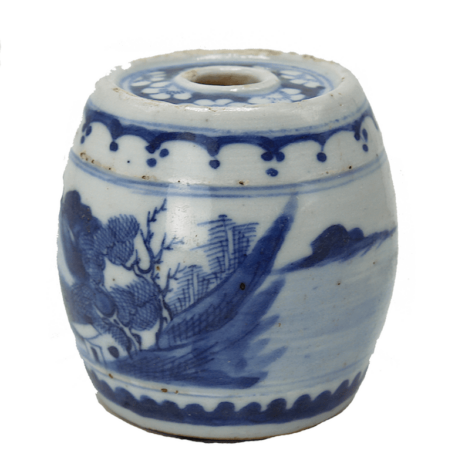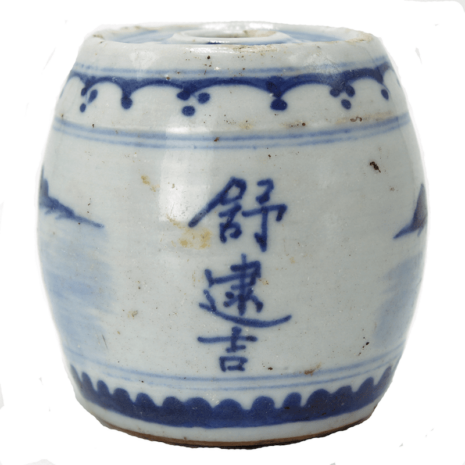Antique Blue and White Porcelain Scholar’s Brush Holder, China (1933A-DOK) SPECIAL PRICE
$255.00
H: 3.25” Dia: 3.25” | FREE SHIPPING WITHIN CONTINENTAL U.S.!
This is unusual piece was likely on a scholar’s desk along with pots, brushes, water droppers, boxes, ink stones and other daily used objects used for a variety of tasks: a brush holder, a paper weight and more. With its round body covered with the landscape of a Chinese village, mountains and seas and the calligraphic name of the scholar owner Shu Dai Ji (舒逮吉) it would be perfect for placement on any style desk or in a study.
Description
Scenes with landscapes, distant mountains, bodies of water and architectural structures in nature are common subjects in the Chinese aesthetic and closely related to the scholar’s beliefs and their way of life that includes Four Scholarly Pursuits (siyi) and Four Treasures of the Scholar’s Studio. The three main Chinese belief systems of Taoism, Confucianism and Buddhism stressed critical aspects of man’s oneness with nature. Taoists asserted harmony in life can only be achieved if one’s energy is in tune with the cosmos through encounters with nature (Albert). In his Analects Confucius wrote “…the wise take pleasure in rivers and lakes, the virtuous in mountains” and “nature is moral and capable of giving instruction.” Buddhists believe “one could find in nature, especially in mountains, the serenity and peace needed to attain a more enlightened frame of mind. Buddhist temples and retreats were built in mountains so that followers could be at one with nature.” (Pei, p. 107) Interesting rocks, gardens and mountain landscapes were special objects for a scholar’s contemplation and were depicted not only on functional objects such as paperweights and brush rests but were also appreciated as objects of beauty and meditation, especially if their form resembled a sacred mountain or believed to contain special energy. Many scholar officials relied on spiritual teachings to seek a new life with the solace of a quiet, contemplative and reclusive life removed from the distracting frenetic life of an official and surrounded themselves with articles that re-enforced their spiritual beliefs. This Tongzhi period blue and white porcelain with the name of the scholar is very personal and calming. This weighty high-fired object with a wide hole in the centerhas a raised top to hold paint dripping from a brush and is painted with cobalt blue petaled flowers under its clear glaze that covers all but the bottom. Its round body is a landscape of a Chinese village, mountains in the distance and seas or lakes with the calligraphic name of the scholar owner Shu Dai Ji (舒逮吉). The scene and calligraphy are well drawn pairs with thick cobalt blue decorative borders above and below. It is in very good condition with expected discolorations and stains consistent with its long use of paints and ink.
Sources
Terese Tse Bartholomew, Hidden Meanings in Chinese Art, Hong Kong. The Asian Art Museum of San Francisco, 2006.
Fang Jing Pei, Treasures of the Chinese Scholar, New York, Weatherhill, 1977.
Patricia Bjaaland Welch, Chinese Art: A Guide to Motifs and Visual Imagery, Singapore, Tuttle publishing, 2008.
Additional information
| Place of Origin | China |
|---|---|
| Period | Antique, Qing Dynasty |
| Date | 19th Century |
| Materials and Technique | Porcelain |
| Dimensions (inches) | Ht: 3.25” Dia: 3.25” |
| Dimensions (metric) | Ht: 8.25cm Dia: 3.25cm |
| Weight | 1 lb 13oz |
| Condition | Very good, see description |
| Item Number | 1933A-DOK |
| Shipping Box Size | |
| Width | 0” to 5.9” |

